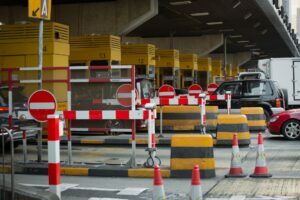Delameta.com – In Indonesia, the toll road boss, commonly known as a concessionaire, plays a crucial role in the development, operation, and maintenance of toll roads. One prominent figure in Indonesia, often referred to as the toll road boss, is Jusuf Hamka, a Chinese-Indonesian Muslim entrepreneur.
Role of Toll Road Boss
In the toll road industry, the boss is responsible for ensuring the toll road is in good condition, maintaining the safety of toll road users, and managing resources needed for smooth toll road operations. They oversee planning, construction, operations, maintenance, and financial management.
Toll road bosses are also responsible for routine maintenance, such as cleaning drainage channels and replacing damaged toll lights. Additionally, they plan and execute major repairs, including fixing road surfaces, bridges, and tunnels.
Ensuring toll road safety is another critical aspect. This involves ensuring clear road signs, road markings, emergency lanes, and other safety facilities.
Technology Development in Toll Roads
Toll road bosses play a vital role in technological advancements within the industry. They constantly seek ways to enhance user experiences, reduce congestion, improve efficiency, and ensure user safety.
One such technology is the electronic toll payment system, allowing users to pay tolls without stopping at toll gates, reducing travel time and congestion. Toll bosses must ensure the proper functioning and accessibility of this system for all road users.
Traffic monitoring and congestion management systems are also developed to predict and address congestion, ensuring a better user experience. Technology is utilized for toll road maintenance, using tools like drones and sensors to monitor road conditions and identify repair needs, speeding up the repair process and improving cost efficiency.
Utilizing Smart City Technology in the Toll Road Industry:
Toll road bosses are responsible for ensuring the safety and comfort of toll road users. This involves maintaining infrastructure in good and safe condition, quickly and effectively repairing road damage.
To enhance user comfort, toll bosses can introduce modern facilities such as clean restrooms, quality food and beverage rest areas, and adequate parking. Introducing electronic toll payment technologies like e-toll and RFID can also improve the toll payment process.
However, toll road bosses must ensure that their managed roads meet high environmental standards. This includes protecting surrounding environments, such as forests or agricultural land, and adopting environmentally friendly technologies like solar panels or eco-friendly building materials.
Compliance with regulations and business ethics is crucial for toll road bosses. In conclusion, the toll road business presents promising opportunities in Indonesia. Success as a boss requires attention to user interests, the local community, environmental standards, and adherence to ethical business practices. This way, toll road businesses can contribute significantly to the overall well-being of Indonesian society and its economy.




